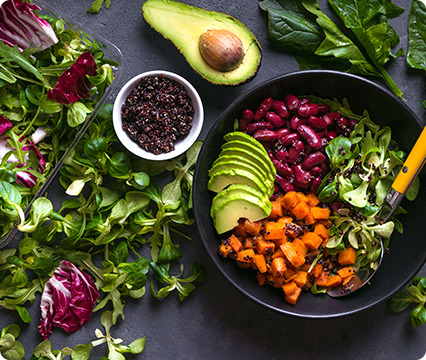Theoretical food and nutrient composition of whole-food plant-based and vegan diets compared to current dietary recommendations
With the rising popularity in whole-food plant-based (WFPB) and vegan diets today, this 2019 study checked whether these diets meet current food-based and nutrient-based recommendations. The WFPB and vegan diet followers who took part in the Adhering to Dietary Approaches for Personal Taste (ADAPT) Feasibility Survey were asked to reveal their main source of information on nutrition and cooking. These resources were used to create 30-day meal plans, which were then compared to various dietary recommendations. Both WFPB and vegan meal plans obtained a healthy eating index of 88 out of 100. Moreover, the whole-food plant-based diet was found to contain more total vegetables (180%), green leafy vegetables (238%), legumes (460%), whole fruit (100%), whole grains (132%), and less refined grains (-74%) than the MyPlate meal plan recommendations. But the amount of fiber in the diet exceeded adequate levels across all age groups. Also, the WFPB meal plans provided less vitamin B12 and D than the Recommended Dietary Allowances (RDAs) for these vitamins and was composed of inadequate calcium levels for women aged 51-70 (according to the RDA). To summarize, the whole-food plant-based diet meal plans were of higher diet quality than the typical U.S. diets with exceptions of vitamins B12 and D without supplementation, and of calcium in older women. [NPID: plant based, whole foods, vegan, vegetarian, ADAPT, fiber, vitamin B12, vitamin D, calcium, older women]
Year: 2019
 Navigation
Navigation






